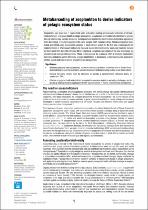| dc.contributor.author | Huggett, Jenny A. | |
| dc.contributor.author | Groeneveld, Johan C. | |
| dc.contributor.author | Cedras, Riaan | |
| dc.date.accessioned | 2023-02-22T09:43:55Z | |
| dc.date.available | 2023-02-22T09:43:55Z | |
| dc.date.issued | 2022 | |
| dc.identifier.citation | Huggett, J. A. et al. (2022). Metabarcoding of zooplankton to derive indicators of pelagic ecosystem status. South African Journal of Science, 118(11-12), #12977. 10.17159/sajs.2022/12977 | en_US |
| dc.identifier.issn | 1996-7489 | |
| dc.identifier.uri | 10.17159/sajs.2022/12977 | |
| dc.identifier.uri | http://hdl.handle.net/10566/8459 | |
| dc.description.abstract | Zooplankton play a key role in marine food webs and carbon cycling and are useful indicators of climate-related changes and ocean health in pelagic ecosystems. Zooplankton are traditionally identified to species through microscopy, but new molecular techniques have enabled the identification of individual specimens (DNA barcoding) or multiple species in the same sample (DNA metabarcoding). Metabarcoding has been tested and refined using zooplankton collected in South African waters for the first time. Challenges to the implementation of DNA-based methods to measure zooplankton biodiversity easily and routinely include an incomplete DNA barcode reference library, logistical complexity and uptake of the new technology by environmental management agencies. These challenges call for a national effort to intensify zooplankton barcoding initiatives and to effectively engage stakeholders in developing a roadmap towards application of DNA-based methods in marine environmental management. | en_US |
| dc.language.iso | en | en_US |
| dc.publisher | Academy of Science of South Africa | en_US |
| dc.subject | Climate change | en_US |
| dc.subject | Biodiversity | en_US |
| dc.subject | Conservation | en_US |
| dc.subject | Biology | en_US |
| dc.subject | South Africa | en_US |
| dc.title | Metabarcoding of zooplankton to derive indicators of pelagic ecosystem status | en_US |
| dc.type | Article | en_US |

